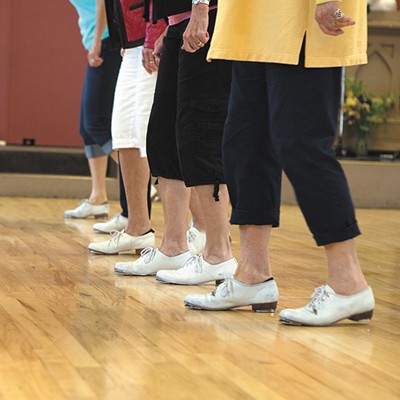
For 71-year-old Jack Bunton, osteoarthritis in his knee had become so bad that bone was rubbing against bone.
"It's very, very painful when you walk," Bunton says. "My left leg was an inch and a half shorter than the right."
Fortunately for the retired auto mechanic, there was a solution: A full knee replacement. In the same way he used to rebuild engines, he could have a new knee.
Long before he went into surgery, he knew that a successful operation didn't begin with the anesthesia. And he knew it didn't end when he woke up, or even when the hospital sent him back home.
"You're trying to get over that insult to your body from your surgery," says Debbie Rappuchi, director of Providence Visiting Nursing Association Home Health Care Services, about orthopedic surgery. "But you're also trying to get over the insult of the surgery and anesthesia."
Whether it's a knee surgery, a hip replacement or a back operation, your body needs to repair the wear and tear on the area around the incision. It needs to flush out the anesthetic. You may be on a regimen of painkillers. For some surgeries, that could mean waiting four to six weeks before you're well enough to drive.
In other words, big lifestyle changes may be in store. "It's really fortunate when people have an opportunity to prepare," Rappuchi says.
Preparing Your Mind and Body
"The stronger you go into surgery, the stronger you come out of surgery," says Jan Collins, a St. Luke's physical therapist with 23 years of experience.
Your primary care physician and a physical therapist can help you get a head start long before the operating room. "I had a therapist working with me," Bunton says. "They gave me some exercises before I even had the surgery, to build up the muscle around the knee. Because you're up and walking as soon as they're done with you."
Each type of surgery carries unique challenges. Local hospitals offer highly recommended classes on surgeries. Michelle Egan, orthopedic care coordinator, teaches pre-surgery classes at Sacred Heart Medical Center. "They need to get themselves ready: What to expect from the minute you come in the hospital door, through your pre-operative period," Egan says. "We also talk to them about making the mental commitment to having a good recovery and a good outcome."
Don't discount the psychological: Nurses and therapists repeatedly emphasize that preparing yourself to do the hard work in therapy to recover afterward — seeing yourself as just as crucial to the medical team as the surgeon, therapist, and anesthesiologist — can make a major difference. Research your surgery. Attend classes. Ask questions. All that preparation will pay off once you begin your recovery.
A Few Changes at Home
For a time, walking around may be difficult after surgery. You may have to use a walker. You may not be able to bend over or easily stand up after using the toilet. In some cases, getting your house ready for returning home can be as simple as moving furniture and improving lighting to make navigation easier.
"We picked up all of our throw rugs, moved sharp edges out of the way — the end tables," Bunton says.
In other cases, needs can be more complicated. "We had a woman who had a total hip replacement," Rappuchi says. "She was brought home by her friends. She sat down on her couch with her coffee. But when her friends left, she couldn't get up because her couch was too low."
So just to be safe, check the height of furniture you plan to use. Can a walker fit through your doorways? Will you be able to climb stairs to get to your bedroom? In some cases, getting in and out of bed can be a challenge, or it may be difficult to get into a good position — equipment is available to help with that. Similarly, you may need a toilet riser or grab bars in your bathroom.
Consider other simple changes, like moving important items to low shelves within easy reach. Have an idea what you'll want to wear post-surgery — pick out soft, comfortable clothes that are easy to put on.
Food and Transportation
Most likely, you'll be expected to be up and on your feet quickly after surgery. But just because you can walk doesn't mean you're able to drive. Be prepared to ask for help getting places for four to six weeks.
If you're married or living with your family, you have a big advantage: someone to help with the cooking and transportation. If you live alone, Miriam Frost, a physical therapist with Rockwood Home Health, recommends having some others lined up to help take you to appointments, get groceries, cook, and take out the garbage. It's always easier to recruit volunteers before you really need them.
Stock up on foods you like that you can easily prepare — the easiest are things that can be thawed and microwaved. Frost recommends gathering lots of prune juice to fight the inevitable post-surgical constipation, as well as lip balm for chapped lips, and suckers, hard candies and Biotene gum to combat dry mouth. Focus on simple foods and small portions first, Frost says, ones that are easy to digest with pain medication.
Fill all your regular medications before your surgery, and a bring a list to the doctor so they can double-check for problematic interactions with your newly prescribed pain medications.
If all goes as planned, you'll reap the benefits of a better knee, hip or back before you know it. "We're going on a cruise at the end of February," Bunton says. Last time he went on a cruise he could barely walk. This time, he's certain he'll enjoy himself.
























